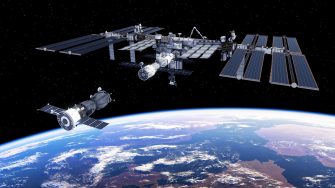Master of Space Engineering (Canberra)
- Commencing Terms
- Semester 1 & 2
- Duration
- 1 Year(s)
- Delivery Mode
- Online, face to face (includes blended)
- Campus
-
Canberra
- Codes
- Program code 8622
- CRICOS code -
-
2026 Indicative first year full fee
- $41,000*
-
2026 Indicative full fee to complete degree
- $41,000*
-
2026 Indicative first year full fee
- $50,500*
-
2026 Indicative full fee to complete degree
- $51,500*

- Overview
- Entry requirements
- What will I study?
- Future careers
- How to apply
- Fees & Scholarships
Overview
Be at the forefront of space exploration with UNSW Canberra’s Master of Space Engineering. This innovative degree equips you with the knowledge and skills to design, build and manage advanced space systems. With Australia’s space industry expanding, your expertise will position you to lead critical projects in Defence, government and private sectors.
This program is designed for postgraduate students with relevant qualifications or extensive professional experience who want to develop a high-level understanding of the principles and practices of engineering related to space. You'll gain hands-on experience with world-class facilities, including satellite ground stations, cleanrooms and Australia’s first concurrent engineering design facility for space missions. Our strong industry connections and research-driven teaching will empower you to turn groundbreaking concepts into real-world solutions.
Graduates of this program are sought after by global aerospace companies, Defence organisations and research institutions. Whether you aspire to work as a spacecraft engineer, mission analyst or satellite designer, this degree will unlock the door to the future of space exploration.
Key features
Experience world-class space facilities
Gain hands-on experience with the latest space technology, including satellite ground stations, a cleanroom, a thermal vacuum chamber laboratory and Australia’s first space mission concurrent engineering design facility.
End-to-end space missions
From design to deployment, UNSW Canberra offers you the opportunity to participate in end-to-end space missions. Develop and manage complex space systems, preparing you to work on high-impact projects and emerging technologies that are driving humanity’s progress in space exploration.
Research-driven learning
With an option to complete a research project, you can make an original contribution to space exploration and innovation. Whether you want to advance in academia or lead research initiatives within the industry, this program provides the foundation to push boundaries and influence the future of space engineering.
Why study at UNSW Canberra?
Australia’s leading space hub
UNSW Canberra is home to the largest space capability in the country. Studying here means learning in a world-class environment at the forefront of space innovation. You’ll be connected to major Defence projects and groundbreaking space missions, positioning you to lead in one of Australia’s most dynamic industries.
Tailored to industry needs
With strong links to the Australian Space Agency, Defence organisations and global aerospace companies, UNSW Canberra ensures that your learning is aligned with the needs of the space industry. This program offers a curriculum designed to meet industry demands, giving you the skills to stay ahead in a rapidly evolving field.
Global career opportunities
Graduating from UNSW Canberra opens doors to prestigious roles in space engineering across Australia and internationally. Our reputation and strong industry partnerships will boost your career potential on a global scale.
Want to see more from UNSW Canberra at ADFA?
Entry requirements
Please refer to the UNSW Handbook for the Entry Requirements.
English language requirements
You may be asked to provide evidence of your English proficiency to study at UNSW depending on your educational background and citizenship. English language skills are vitally important for coping with lectures, tutorials, assignments and examinations - this is why UNSW requires a minimum English language competency for enrolment.
If you’re completing an Australian Year 12 qualification (e.g. NSW HSC or equivalent), you do not need to provide anything extra to prove your proficiency. Your qualification will be used as evidence of your English proficiency.
If you do need to provide evidence of your English proficiency, this will be indicated in your application. You can prove this by providing evidence that you meet one or more of the following criteria:
- English language tests and university English courses
- Prior study in the medium of English
- Other qualifications
If you need to improve your English skills before you start your degree, UNSW College’s Academic English Programs are for you. The programs are suitable for various English levels and help you prepare for university studies and life in Australia.
For more details, visit the English Language Requirements page.
Please refer to the UNSW Handbook for the Entry Requirements.
English language requirements
You may be asked to provide evidence of your English proficiency to study at UNSW depending on whether you are from an English-speaking background or non-English speaking background. English language skills are vitally important for coping with lectures, tutorials, assignments and examinations - this is why UNSW requires a minimum English language competency for enrolment.
If English is not your first language, you’ll need to provide proof of your English proficiency before you can be given an offer to study at UNSW. You can do this by providing evidence that you meet one or more of the following criteria:
- English language tests and university English courses
- Prior study in the medium of English
- Other qualifications
If you need to improve your English skills before you start your degree, UNSW College’s Academic English Programs are for you. The programs are suitable for various English levels and help you prepare for university studies and life in Australia.
For more details, visit the English Language Requirements page.
Check the specific English language requirements for this program
What will I study?
UNSW is introducing a new academic calendar from 2028.
We are moving to a new flex-semester calendar. What does this mean for your studies?
Program structure
The Master of Space Engineering at UNSW Canberra is a one-year degree. Students must complete 48 Units of Credit (UOC), made up of four core courses and four elective courses.
You’ll study a mix of core and elective courses that cover key aspects of space systems engineering. The core courses focus on space operations, satellite communications and systems engineering, providing you with a strong technical foundation. You can tailor your studies with electives in areas such as spacecraft design, propulsion and space mission analysis.
With the option to undertake a research project, you’ll have the opportunity to dive deeper into a specific area of interest and contribute to cutting-edge developments in space exploration.
Full program structure
This program contains a total of 48 units of credit (UOC) and can be completed in one year of full-time study. Students must complete:
-
- Space Operations
- Space Systems Design
-
- Global Navigation Satellite Systems (GNSS)
- Space Systems Engineering Management
- Satellite Communications
- Space Propulsion
- Spaceborne Imaging Technology
- Project Report - Engineering Science (Full-Time)
- Project Report - Engineering Science (Part-Time)
-
- Information Assurance Principles
- Model Based Systems Engineering
- Requirements Practice
- Test and Evaluation
- Project Management Body of Knowledge
- Applied Machine Learning
- Space Cooperation, Conflict and Competition
Future careers
Graduates of the Master of Space Engineering will enter a rapidly growing sector with boundless opportunities. The Australian Space Agency plans to triple the size of Australia’s space economy and create up to 20,000 additional jobs by 2030 (Queensland Government, 2023).
You’ll be positioned to take on pivotal roles such as satellite engineer, spacecraft designer, or mission analyst, working on the next generation of space missions. Tackle global challenges like space debris management and communication systems and drive technological progress in Australia’s evolving space industry.
Potential roles
- Aerospace Engineer
- Astronautical Engineer
- Avionics Engineer
- Defence Engineer
- Flight Systems Engineer
- Guidance, Navigation and Control (GNC) Engineer
- Launch Systems Engineer
- Mission Control Engineer
- Payload Engineer
- Propulsion Engineer
- Satellite Communications Engineer
- Satellite Systems Engineer
- Space Operations Engineer
- Space Systems Analyst
- Spacecraft Design Engineer
- Spacecraft Operations Engineer
- Systems Engineer
- Telecommunications Engineer
- Test Engineer
- Thermal Engineer
How to apply
Applications must be submitted through our Apply Online portal. We encourage you to submit your completed application as early as possible to ensure it will be processed in time for your preferred term. Some high-demand programs and Faculties with limited places may have an earlier application deadline or commencement date. Find out more.
Ready to start your application?
For most international students, applications are submitted via our Apply Online service. We encourage you to submit your completed application as early as possible to ensure it will be processed in time for your preferred term.
Some high-demand programs with limited places, may have an earlier application deadline or may have an earlier commencement date. For details, visit the international admissions information page.
Ready to start your application?
Fees & Scholarships
*Fees are subject to annual review (or when required) by the University and may vary accordingly.
Indicative fees are a guide only and have been calculated based on the typical enrolment patterns of students undertaking the program. The indicative fees listed here is an estimate for tuition only and excludes non-tuition fees and charges. The amount you pay will vary depending on the calendar year of enrolment, the courses you select and whether your study load is more or less than 1 Equivalent Full Time Student Load (48 units of credit (UOC) per year).
You should not rely on indicative fees as fee increases are assessed when required and may exceed the indicative figures listed here. Actual fees are calculated on enrolment. More information on fees can be found at the UNSW fees website.
*Fees are subject to annual review by the University and may increase annually, with the new fees effective from the start of each calendar year. The indicative fees listed here are based on an estimated average and are for tuition only, other fees and charges are not included. The amount you pay will vary depending on the calendar year to enrol, the courses you select and whether your study load is more or less than 1 Equivalent Full Time Student Load (8 courses per year).
Indicative fees are a guide for comparison only based on current conditions and available data. You should not rely on indicative fees. More information on fees can be found at the UNSW fees website.
Indicative fees to complete the program have been calculated based on a percentage increase for every year of the program. Fee increases are assessed annually and may exceed the indicative figures listed here.
Indicative fees to complete the program include tuition plus an estimate of study-related costs of approximately $1,000 per year. To find out more about other costs, visit UNSW International.
Scholarships
At UNSW, we award over $83 million in scholarships each year. We pride ourselves on rewarding excellence and making university accessible to students from all walks of life. Whether you’re a domestic or international student, our range of scholarships, prizes and awards can support your journey.
Progress starts here – at a world-leading university

Top 20 Worldwide
Ranked in the global top 20 for three consecutive years
QS World University Rankings, 2024–2026

Winner of the AFR Most Employable University Award six years in a row
AFR Top100 Future Leaders Awards, 2020–2025

Australia's #1 for Innovation
Highest number of startups and spinouts from university-developed tech
SCOPR report, 2024




